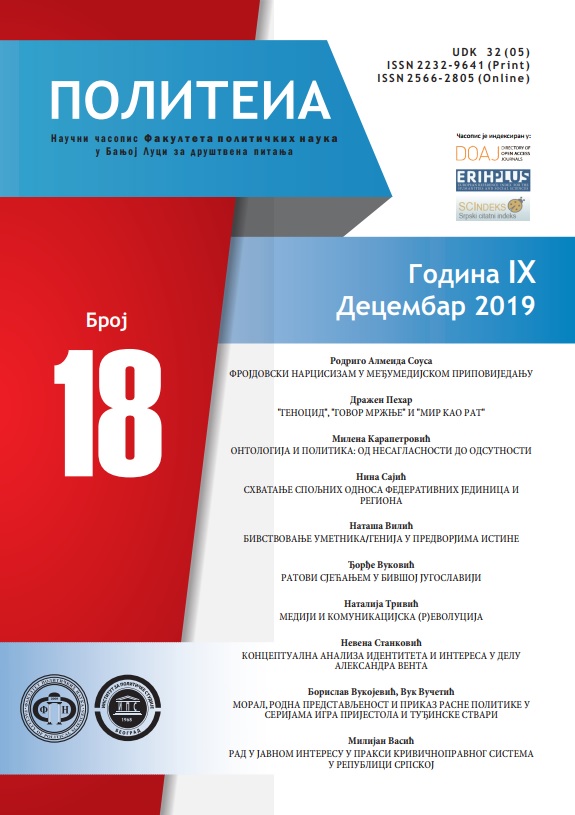MORALITY, GENDER REPRESENTATION AND DESCRIPTION OF RACIAL POLICY IN THE TV SERIES OF GAME OF THRONES AND STRANGER THINGS
Abstract
The paper examines the thesis about the elements of gender, race, and morality discrimination in popular media culture, with an emphasis on two television series: Game of Thrones and Stranger Things. The main research question is whether the elements of discrimination that are most commonly found in Hollywood productions can be found in these series as well. Using the method of multi-perspective cultural studies and looking at the subject dealt with through the constructivist paradigm, the authors conclude that in popular culture, such as the aforementioned series, there are elements of discrimination: morality is dominantly nihilistic, with few characters possessing moral integrity; racial discrimination is evident both in the story and in the cast selection; gender representation is stereotyped, men get a lot more space. The authors argue that it is impossible to explore current media effects on audiences, but it is possible to interpret messages and meanings in popular media culture.
References
Bandura, A. (2002). Social cognitive theory of mass communication. In J. Bryant & D. Zillmann (Eds.), Media Effects: Advances in theory and research (2nd ed., pp. 121–154). Mahwah, NJ: Erlbaum.
BBC.com. (2019). Game of Thrones: How much do women speak in the show?. dostupno na https://www.bbc.com/news/entertainment-arts-48335099
Benshoff, H. & Griffin, S. (2009). America on film, representing race, class, gender and sexuality at the movies. New York: Blackwell Publishing.
Bilandžić, H., Hastall M., Sukalla F. (2017). The Morality of Television Genres: Norm Violations and Their Narrative Context in Four Popular Genres of Serial Fiction, Journal of Media Ethics, 32:2, 99–117.
Biltereyst, D. (2004). Media Audiences and the Game of Controversy: On Reality TV, Moral Panic and Controversial Media Stories. Journal of Media Practice, 5(1), 117–137.
Cvitanovich, Z. (2013). Game of thrones Empowering Women or Perpetuating Traditional Archetypes?, dostupno na: https://www.researchgate.net/publication/269107575_Game_of_Thrones_Empowering_Women_or_Perpetuating_Traditional_Archetypes
Eden, A., Grizzard M., Lewis, R. (2013). Moral Psychology and Media Theory: Historical and Emerging viewpoints. In R. Tamborini (Ed.), Media and the Moral Mind (pp. 1–25). New York/ London: Routledge.
Ferreday, D. (2015). Game of thrones, Rape Culture and Feminist Fandom. Australian Feminist Studies. 30.83: 21–36
Foa, M. (2017). Gospodari medija. Beograd: Clio.
Gerbner, G, Gross, L., Morgan, M., Signorielli, N. (1980). The „mainstreaming“ of America: Violence profile no. 11. Journal of communication, 30(3), 10–29.
Gerbner, G. (2002). Cultural Indicators: The Third Voice. In M. Morgan (Ed.), Against the Mainstream: The Selected Works of George Gerbner (pp.175-192). New York: Peter Lang Publishing.
Gerbner, G., Gross, L. (1976). Living with television: The violence profile. Journal of Communication, 26, 173–199.
Gunter, B. (1984). Television as a facilitator of Good Behaviour amongst Children.Journal of Moral Education, 13(3), 152–159.
Hall, S. (1973). Encoding and Decoding in the Television Discourse, dostupno na: https://www.birmingham.ac.uk/Documents/college-artslaw/history/cccs/stencilled-occasional-papers/1to8and11to24and38to48/SOP07.pdf
Hassler-Forest, D. (2015), Game of Thrones : The Politics of World-Building and the Cultural Logic of Gentrification, U: D.Hassler- Forest, P. Nicklas (ed), The Politics of Adaptation Media Convergence and Ideology, Basingstoke: Palgrave Macmillan: 187–201.
Kelner, D. (2004). Medijska kultura. Beograd: Clio.
Lauzen M., Dozier, D., Horan, N. (2008). Constructing Gender Stereotypes Through Social Roles in Prime-Time Television, Journal of Broadcasting & Electronic Media, 52:2: 200–214
Potter, J., Ware, W. (1987). An analysis of the contexts of antisocial acts on prime-time television. Communication Research, 16(6), 664-686.
Pritchard, E. (2017). Cultural Representations of dwarfs and their disabling affects on dwarfs in society, dostupno na: https://cdjournal.scholasticahq.com/article/1985-cultural-representations-of-dwarfs-and-their-disabling-affects-on-dwarfs-in-society
Sandqvist, E. (2011). Politics, Hidden Agendas and A Game of Thrones: An Intersectional Analysis of Women's Sexuality in George R.R. Martin's A Game of Thrones. Luleå University of Technology Department of Arts, Communication and Education, dostupno na: http://www.diva-portal.org/smash/get/diva2:1028601/FULLTEXT02.pdf
Selnow, G. (1986). Solving Problems on Prime-Time Television. Journal of Communication, 36 (2), 63–72.
Sennet, R. (1989). Nestanak javnog čovjeka. Zagreb: Naprijed.
Sutherland, J., Siniawsky, S. (1982). The Treatment and Resolution of Moral Violations on Soap Operas. Journal of Communication, 32 (2), 67–74.
Tan, A., Nelson L., Dong, Q., Tan G. (1997). Value acceptance in adolescent socialization: A test of a cognitive-functional theory of television effects. Communication Monographs, 64, 82–97.
Tavener, J. (2000). Media, Morality, and Madness: The Case against Sleaze TV. Critical Studies in Media Communication, 17(1), 63–85.
Wakefield, M., Flay, B., Nichter, M., Giovino, G. (2003). Role of the media in influencing trajectories of youth smoking. Addiction, 98, 79–103.
Warner, K. (1987). Television and health education: Stay tuned. American Journal of Public Health, 77, 140–142.
Wood, J. (1994). Gendered Media: The Influence of Media on Views of Gender, U: J.Wood (ed.) Gendered Lives: Communication, Gender, and Culture, Belmont, Calif. : Wadsworth Pub: 31–41
Copyright (c) 2019 Politeia

This work is licensed under a Creative Commons Attribution 4.0 International License.
Autori koji objavljuju u ovom časopisu pristaju na sljedeće uslove:
- Autori zadržavaju autorska prava i pružaju časopisu pravo prvog objavljivanja rada i licenciraju ga "Creative Commons Attribution licencom" koja omogućava drugima da dijele rad, uz uslov navođenja autorstva i izvornog objavljivanja u ovom časopisu.
- Autori mogu izraditi zasebne, ugovorne aranžmane za neekskluzivnu distribuciju članka objavljenog u časopisu (npr. postavljanje u institucionalni repozitorijum ili objavljivanje u knjizi), uz navođenje da je članak izvorno objavljen u ovom časopisu.
- Autorima je dozvoljeno i podstiču se da postave objavljeni članak onlajn (npr. u institucionalni repozitorijum ili na svoju internet stranicu) prije ili tokom postupka prijave rukopisa, s obzirom da takav postupak može voditi produktivnoj razmjeni ideja i ranijoj i većoj citiranosti objavljenog članka (Vidi Efekti otvorenog pristupa).

